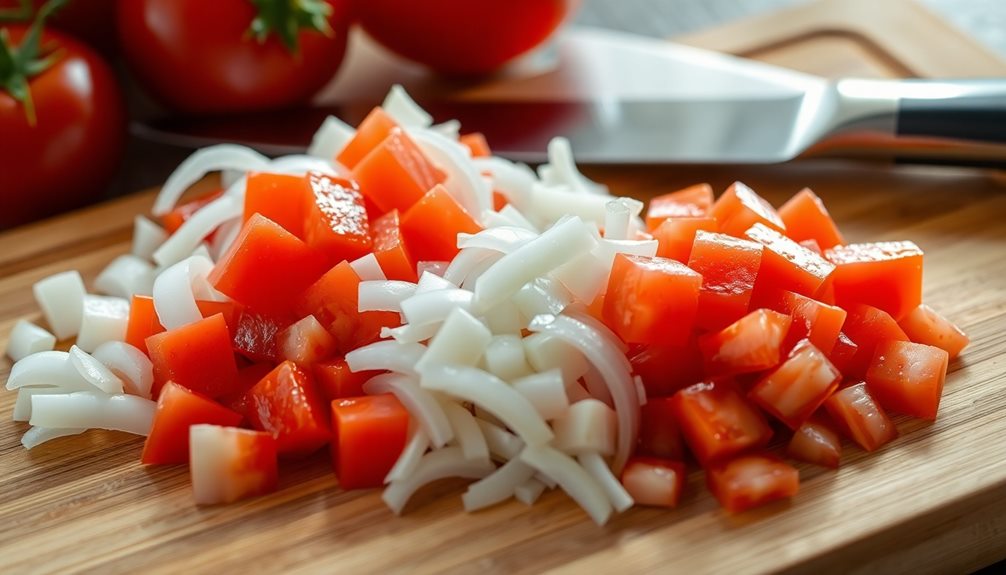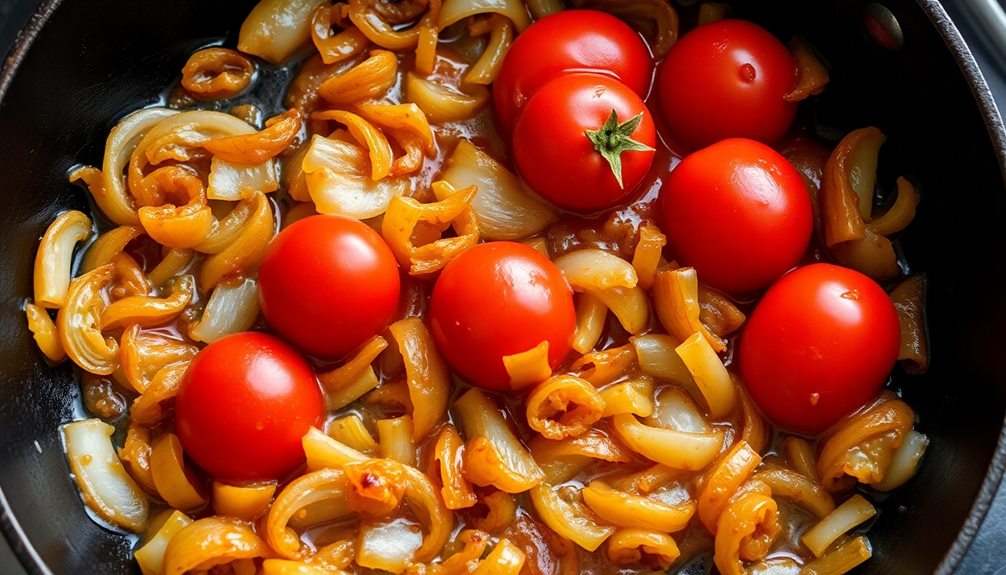You'll love Nigerian egg sauce – a delectable West African dish that blends savory eggs, tangy tomatoes, and aromatic onions and spices. Its origins stretch back through generations of culinary traditions, and the recipe has evolved over time with global influences. The preparation is surprisingly simple, involving a careful simmering process that imbues the sauce with rich, complex flavors. Serve this versatile side dish alongside your favorite staples like rice or yams, and let the mouthwatering aroma and vibrant colors transport you to the heart of West African cuisine. If you'd like to learn more about the step-by-step cooking process, keep reading.
Key Takeaways
- Nigerian Egg Sauce is a traditional West African dish made with simple, locally sourced ingredients like eggs, tomatoes, onions, and spices.
- The sauce is simmered to develop a rich, creamy, and flavorful texture, complementing staple dishes like rice and yams.
- Preparation involves dicing aromatics, sautéing, adding eggs, and simmering to achieve the perfect balance of flavors.
- Garnishing with fresh cilantro adds a bright, herbaceous note, enhancing the visual appeal and overall taste experience.
- Nigerian Egg Sauce is a versatile dish that can be served as a side, topping, or dip, offering a nutritious and delightful culinary option.
History

The origins of Nigerian egg sauce can be traced back to the vibrant culinary traditions of West Africa. This beloved dish has been a staple in Nigerian homes for generations, passed down from mother to daughter, each family adding their own unique twist.
Traditionally, the sauce was made with simple, locally sourced ingredients, like eggs, tomatoes, onions, and spices. The preparation was a labor of love, with women carefully simmering the ingredients to create a rich, flavorful sauce.
Over time, the recipe evolved, incorporating new flavors and techniques as Nigerian cuisine blended with global influences.
Today, Nigerian egg sauce remains a beloved side dish, often served alongside staples like rice, yams, or fufu. The savory, slightly spicy sauce complements a variety of main dishes, making it a versatile addition to any meal.
Whether enjoyed at home or in a local eatery, this humble dish continues to be a beloved part of Nigerian culinary heritage. Its versatility and comforting flavors make it a staple across regions, bringing families and communities together over shared meals. Many cooks take pride in perfecting their tuwo recipes and preparation tips, passing down cherished techniques from one generation to the next. This timeless dish not only reflects Nigeria’s rich cultural diversity but also highlights the deep connections between food, tradition, and identity.
Cooking Steps

To begin the cooking process, gather all the necessary ingredients and equipment. You'll need a large skillet or pot, a sharp knife, and a cutting board.
Carefully chop the onions, tomatoes, and peppers into small pieces. Crack the eggs into a bowl and whisk them lightly with a fork.
Next, heat some oil in the skillet over medium heat. Add the chopped onions and sauté them until they're translucent and fragrant.
Then, toss in the tomatoes and peppers. Cook the mixture, stirring occasionally, until the vegetables are softened and the flavors have melded together.
Carefully pour the whisked eggs into the skillet and gently stir them with a spatula. As the eggs cook, continue to stir them, ensuring they don't stick to the pan.
Season the egg sauce with salt and pepper to taste. Finally, remove the skillet from the heat and serve the delicious Nigerian egg sauce hot, alongside your favorite dishes.
Step 1. Dice Onions and Tomatoes

After rinsing the eggs, you'll need to dice the onions and tomatoes. Start by chopping the onions first. Slice them in half, then cut each half into thin strips.
Next, stack the strips and slice them crosswise to create small, uniform cubes. Be careful not to cut yourself – onions can make your eyes water!
Now it's time for the tomatoes. Wash them thoroughly and pat them dry. Slice the tomatoes in half, then dice them into small pieces.
Try to make the tomato cubes about the same size as the onion pieces. This will help everything cook evenly in the pan.
Once you've diced both the onions and tomatoes, you're ready to move on to the next step. The savory aromatics are prepped and waiting to infuse the egg sauce with incredible flavor.
Keep up the good work – you're well on your way to creating a delicious Nigerian egg dish!
Step 2. Sauté Onions and Tomatoes

Now that you've prepped the aromatic veggies, it's time to start cooking. In a large skillet or saucepan, heat a drizzle of oil over medium heat. Once the oil is shimmering, add the diced onions. Sauté the onions, stirring occasionally, until they become soft and translucent, about 5 to 7 minutes. For a healthy twist, consider using a carrier oil like jojoba oil to enhance the flavor of your dish while adding skin benefits.
Next, add the diced tomatoes to the pan. Continue sautéing the onions and tomatoes together, stirring frequently, for another 5 to 7 minutes. As the mixture cooks, the tomatoes will break down, releasing their juices and creating a flavorful base for the sauce.
Be sure to season the sautéed vegetables with a pinch of salt and pepper. You can also add a touch of garlic powder or dried herbs, like basil or thyme, to enhance the flavor profile.
Keep a close eye on the pan, adjusting the heat as needed, to prevent the onions and tomatoes from burning or sticking to the bottom.
Step 3. Add Eggs and Seasoning

With the aromatic sautéed onions and tomatoes as the base, you'll now add the eggs to create the signature Nigerian egg sauce.
Crack the eggs directly into the pan, letting them sizzle and gently scramble. As the eggs cook, be sure to stir them frequently to ensure they don't overcook and become dry.
Once the eggs are mostly set, it's time to season the dish. Sprinkle in a generous amount of salt and pepper, adjusting to your taste. For an extra flavor boost, you can also add a dash of garlic powder, paprika, or your favorite Nigerian spice blend.
Stir everything together until the seasonings are evenly distributed, and the eggs are fully cooked. The result is a rich, creamy, and flavorful egg sauce that pairs perfectly with rice, yams, or your other Nigerian meal staples.
Get ready to savor the delightful combination of textures and tastes in every bite.
Step 4. Simmer the Egg-Tomato Mixture

Once the eggs have been gently scrambled into the sautéed onions and tomatoes, you'll want to let the entire mixture simmer for a few minutes. This allows the flavors to meld and the sauce to thicken up nicely.
Keep the heat at medium-low, stirring occasionally, so the eggs don't overcook and become rubbery.
As the sauce simmers, the tomatoes will break down further, creating a rich, velvety texture. The eggs, meanwhile, will continue to gently cook, becoming perfectly soft and creamy. This balanced combination of tender eggs and tangy tomatoes is the hallmark of a delicious Nigerian egg sauce.
Pay close attention during this simmering stage, as you don't want the sauce to dry out. Add a splash of water or broth if it starts to look too thick.
After about 5-7 minutes, your egg-tomato mixture will be ready to serve as a flavorful side dish or topping for your favorite Nigerian meals.
Step 5. Garnish With Fresh Cilantro

Finally, garnish the simmered egg-tomato mixture with a generous sprinkling of fresh cilantro. This fragrant herb adds a bright, herbaceous note that perfectly complements the rich flavors of the sauce.
The delicate, feathery leaves of the cilantro will provide a beautiful contrast to the vibrant colors of the dish, making it an absolute delight for the senses.
As you sprinkle the cilantro over the top, take a moment to breathe in the aroma – it's truly captivating! The combination of the sauce's warmth and the cool, crisp cilantro will tantalize your taste buds, leaving you eagerly anticipating the first bite.
This final touch ensures that your Nigerian Egg Sauce is a well-rounded and visually appealing dish, ready to be shared and enjoyed by all. With the cilantro garnish, the flavors and textures of this comforting side dish come together in perfect harmony.
Final Thoughts

Ultimately, the Nigerian Egg Sauce is a delightful and versatile dish that's sure to tantalize your taste buds. Once you've tried this flavorful creation, you'll be hooked!
The combination of savory eggs, aromatic spices, and fresh cilantro creates a symphony of flavors that will leave you craving more.
What's great about this dish is its versatility. You can serve it as a side, top it over rice or pasta, or even enjoy it as a dip with crunchy vegetables. The possibilities are endless!
And let's not forget the health benefits – eggs are a fantastic source of protein, and the herbs and spices provide a boost of antioxidants.
Frequently Asked Questions
What Are the Typical Ingredients Used in Nigerian Egg Sauce?
Typical ingredients in Nigerian egg sauce include eggs, tomatoes, onions, spices like curry and thyme, and sometimes fish or meat. You'll find this savory, protein-rich sauce is a versatile accompaniment to various Nigerian dishes.
How Can the Spiciness of the Egg Sauce Be Adjusted?
To adjust the spiciness of the egg sauce, you can add more or fewer chili peppers. Start with a small amount, taste, and gradually increase the quantity of peppers until you reach your desired level of heat.
What Are Some Common Variations of the Nigerian Egg Sauce?
You can adjust the spiciness of the Nigerian egg sauce by adding more or less chili peppers or hot sauce. Common variations include using different types of vegetables, adding peanuts, or incorporating smoked fish or meat for extra protein and flavor.
How Long Does the Egg Sauce Typically Take to Prepare?
Typically, the egg sauce takes around 30-45 minutes to prepare. The actual time can vary depending on your cooking skills and the number of ingredients you're using. Don't be intimidated, though – it's a straightforward dish that's well worth the effort.
Can the Egg Sauce Be Made in Advance or Stored for Later Use?
Yes, you can make the egg sauce in advance and store it for later use. It keeps well in the refrigerator for up to 3 days, allowing you to prepare it ahead of time and reheat when needed.









